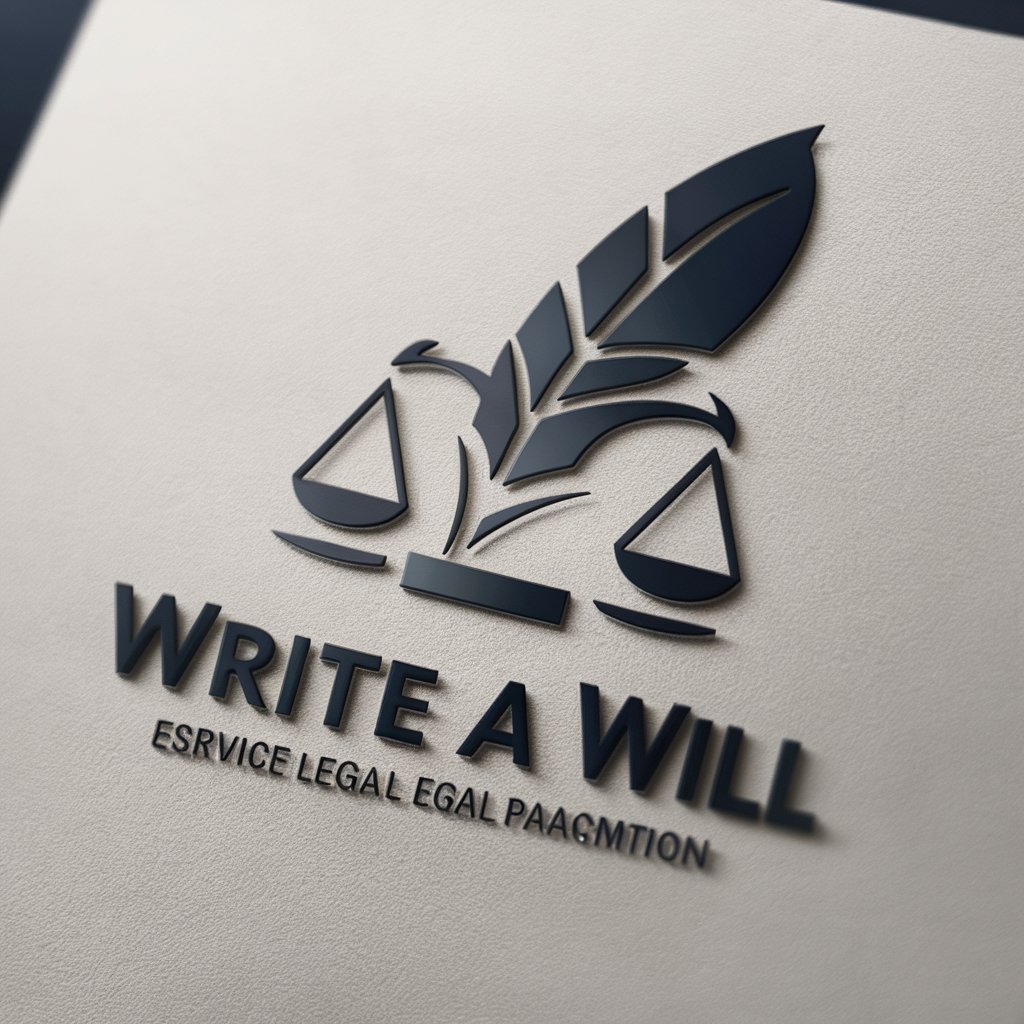Estate Planning - Estate Planning Guidance

Welcome to Estate Planning Information. How can I assist you today?
AI-Powered Estate Management Solutions
Can you explain the difference between a will and a trust?
What are the key components of a comprehensive estate plan?
How does a living trust work in estate planning?
What are the benefits of setting up a power of attorney?
Get Embed Code
Understanding Estate Planning: Functions and Purpose
Estate Planning is a crucial legal and financial process designed to manage and distribute an individual's assets in the event of their incapacity or death. Its basic functions encompass the creation of wills, setting up trusts, designating beneficiaries, and minimizing taxes and legal hurdles for the heirs. The purpose of Estate Planning goes beyond the mere distribution of assets; it ensures that an individual's wishes regarding their estate are fulfilled, medical decisions are prearranged, and family conflicts are minimized. For example, an individual might use Estate Planning to establish a trust for their minor children, ensuring that the children are financially secure and that the assets are managed according to the individual's wishes until the children reach adulthood. Another scenario might involve an individual setting up a healthcare directive and power of attorney, which specify their healthcare preferences in case they become incapable of making decisions themselves and designate someone to make financial and health-related decisions on their behalf. Powered by ChatGPT-4o。

Core Functions of Estate Planning
Creation of Wills and Trusts
Example
A person creates a will to designate how their assets should be distributed among heirs, and establishes a trust to provide for a special needs family member without jeopardizing their eligibility for government benefits.
Scenario
In a family where a child has special needs, Estate Planning ensures that a trust is set up to manage assets for the child's benefit, detailing how the trustees use the funds for the child's care.
Designation of Beneficiaries
Example
Updating life insurance policies and retirement accounts to ensure they reflect current wishes, bypassing the probate process and directly transferring assets to the named beneficiaries.
Scenario
After a divorce, an individual updates their beneficiary designations on their life insurance and retirement accounts to ensure that these assets are passed on to their new spouse and children, rather than an ex-spouse.
Advanced Healthcare Directives
Example
Creating documents that specify what medical actions should be taken if they're unable to make decisions due to illness or incapacity.
Scenario
An elderly person establishes an advanced healthcare directive to communicate their wishes about end-of-life care and appoints a trusted family member as their healthcare proxy.
Power of Attorney
Example
Granting a trusted individual the authority to handle financial and legal matters if the principal becomes unable to manage their own affairs.
Scenario
A business owner designates a durable power of attorney to a spouse or trusted partner to ensure that the business and personal financial matters continue smoothly in the event of unexpected incapacitation.
Who Benefits from Estate Planning Services
Individuals with Dependents
Parents, guardians, or caretakers of minors or dependents with special needs benefit immensely from Estate Planning. It allows them to set up guardianships, trusts, and directives ensuring the well-being and financial security of their dependents after they're gone or if they become incapacitated.
Property and Asset Owners
Anyone owning property or significant assets, regardless of marital status or wealth level, needs Estate Planning to dictate how their assets are distributed, minimize estate taxes, and avoid the lengthy and public probate process.
Older Adults and Individuals with Health Concerns
As individuals age or face serious health issues, Estate Planning becomes critical to manage healthcare decisions and financial affairs, ensuring that their wishes are respected and that a trusted person can make decisions on their behalf.
Business Owners
Estate Planning is essential for business owners to ensure smooth succession and continuation of their business, protect the business's value, and provide for their heirs without burdening them with business-related legal challenges.

Guidelines for Utilizing Estate Planning
Start Your Journey
Initiate your estate planning process by accessing yeschat.ai, offering a no-cost trial without the necessity for login or subscription to ChatGPT Plus.
Identify Goals
Clarify your estate planning objectives, whether it's asset distribution, minimizing taxes, or ensuring financial security for your loved ones.
Gather Documentation
Compile essential documents such as property deeds, financial statements, and insurance policies to streamline the estate planning process.
Consult Professionals
Engage with legal and financial advisors to ensure your estate plan aligns with legal standards and your personal goals.
Review and Update
Regularly review your estate plan, especially after major life events like marriage, divorce, or the birth of a child, to ensure it remains effective and relevant.
Try other advanced and practical GPTs
Estate Sales
Streamlining Estate Sale Processes with AI

Estate Sale
Streamlining Estate Sales with AI

Luxury Estate Property Finder
Discover Your Dream Estate with AI

电商产品介绍页(Listing)精灵
Elevate Your Product Listings with AI

New Life Wellness
AI-powered Health & Lifestyle Content Planner

Did You Know Video Email - FD Applicants
Streamlining Franchise Communications with AI

Estate AI
Empowering Real Estate Decisions with AI

Listing Wizard
Empowering Sellers with AI-Driven Listings

Write a Will
Simplify estate planning with AI

California Estate Planner
Voice-Powered Estate Planning Simplified

Property Listings Wizard
Elevate Your Listings with AI

Property Pro
Empowering Real Estate Decisions with AI

Frequently Asked Questions about Estate Planning
What is the primary purpose of estate planning?
Estate planning is aimed at managing and preserving your assets while you're alive, and controlling their distribution after your death, according to your wishes. It ensures that your assets are distributed to your intended beneficiaries, potentially reduces taxes, and can establish directives for your health care preferences.
How often should I update my estate plan?
You should review and possibly update your estate plan every three to five years, or sooner if there are significant changes in your life such as marriage, divorce, the birth of a child, or significant changes in your financial status.
Can estate planning reduce taxes?
Yes, strategic estate planning can help minimize taxes imposed on your estate. Tools like trusts, gifting strategies, and charitable donations can be effective in reducing estate and inheritance taxes.
What's the difference between a will and a trust?
A will is a document that specifies how your assets will be distributed after your death. A trust, on the other hand, is a legal arrangement where one party holds assets on behalf of another party. Trusts can be used to provide legal protection for your assets, ensure that your assets are distributed according to your wishes, and avoid or minimize estate taxes.
Is estate planning only for the wealthy?
No, estate planning is beneficial for anyone who wishes to have a structured plan for their assets after their death. It ensures that your assets are distributed according to your wishes, can protect your beneficiaries, and can prevent unnecessary legal complications or disputes.
